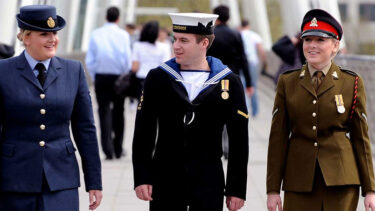Perseverance, loyalty and adaptability: Service leavers have so much to offer


A change of career is a leap of faith; it forces you to re-evaluate what you know and find a place for that knowledge in a completely new industry.
That’s a daunting prospect for anyone. I faced the same thing when I left the Royal Navy 24 years ago. As a clearance diver, I had specialist skills and I had to find a way of using those skills elsewhere. What I soon came to find was that there’s a wealth of unique experience you benefit from in the Armed Forces that shapes you in ways that are suited to so many industries, particularly construction.
Much of what you learn in the Armed Forces becomes so ingrained in the day-to-day that you can easily forget how valuable those skills are. Perseverance and determination are perfect examples.
In the military you are really pushed to the limits and this teaches you that there is a way to achieve the seemingly impossible.
By planning well, keeping a cool head, breaking down a task and being adaptable to change, you can overcome any challenge under any circumstances and in a high-pressure industry such as construction, this is an invaluable skill.
Teamwork is a given and there aren’t many careers where this isn’t important. Working in silos is universally, and quite rightly, considered to be inefficient and ineffective. But teamwork takes on a whole new meaning in the Armed Forces.
When I was in the Royal Navy, I worked as part of a Special Forces Team. In that team everyone had a specialism that they led on. In that scenario, you know what you bring to the table and likewise you know who to turn to on matters that aren’t your specialism. This breeds strong mutual respect and loyalty within a team. It has been the cornerstone of the Armed Forces for generations and it is one of the most important transferable skills service leavers have.
The Chartered Institute of Building (CIOB) has predicted that the construction industry needs 160,000 new recruits by 2023 and with so many skills that match this sector, it is no surprise that advocates like myself and the wider Wates Group are encouraging former military personnel to consider making the built environment their next career choice. But it isn’t enough for us to simply fly the flag for construction, we need to support and mentor service leavers in making this step.
We’re very proud to be working with BuildForce to do just that. As a collaborative employer-led project, BuildForce works to support military veterans and service leavers into careers in construction and the built environment. I recently had the privilege of attending a Wates-sponsored BuildForce Insight event and I was so impressed with the talent in the room. With natural aptitude, carefully honed skills and diverse strengths, those that are leaving the Armed Forces have so much to offer and as ex-military myself this makes me very proud.
My advice to service leavers would be to never doubt your capabilities. Leaving behind everything that you know is a big step but it’s an exciting one. No matter your role in the Armed Forces, whether you were a medic, a chef or a Lieutenant Colonel, you honed very specialist expertise in a high-pressure environment. You have skills that set you apart and those skills are more than welcome in the construction industry.